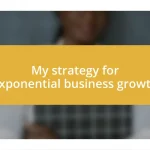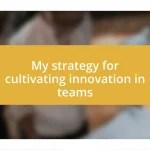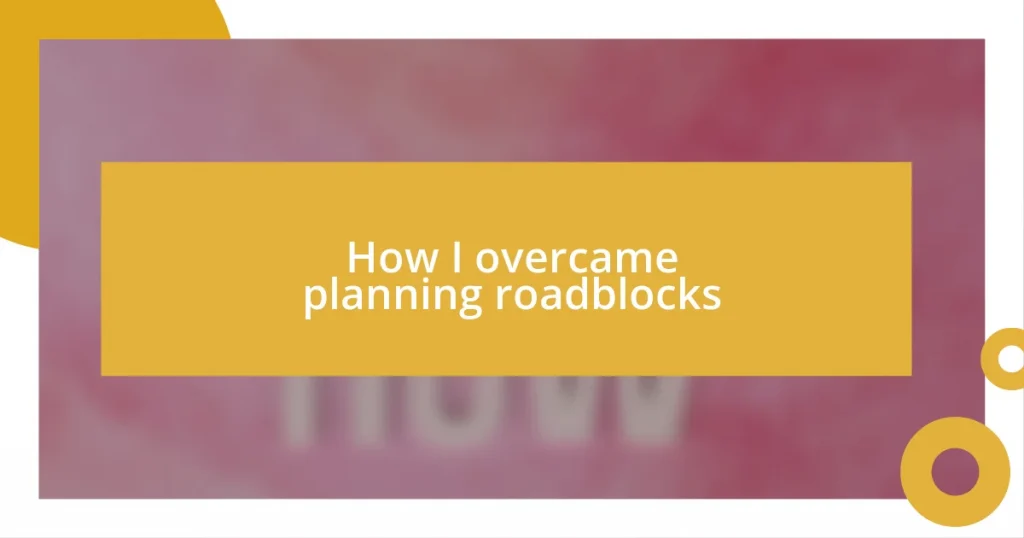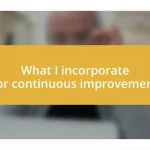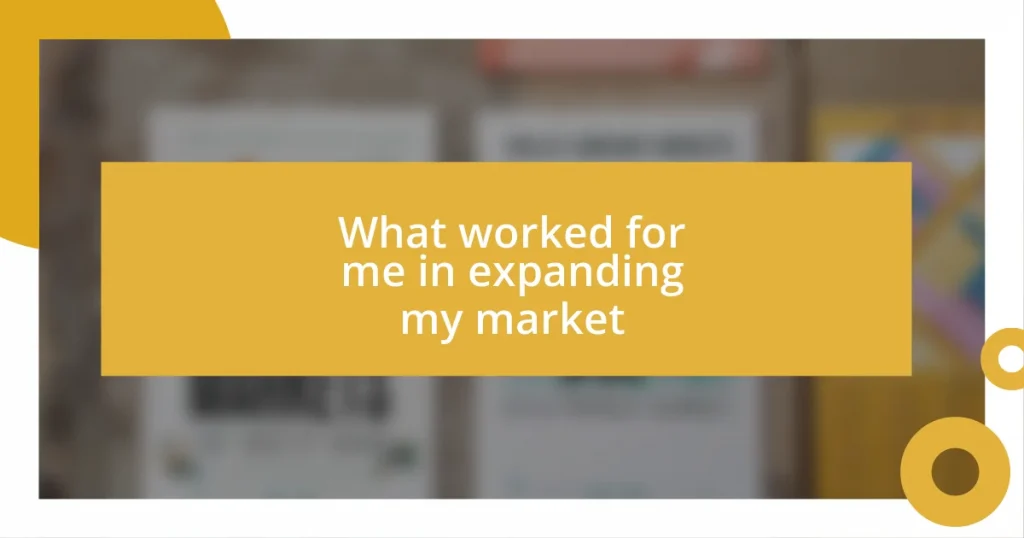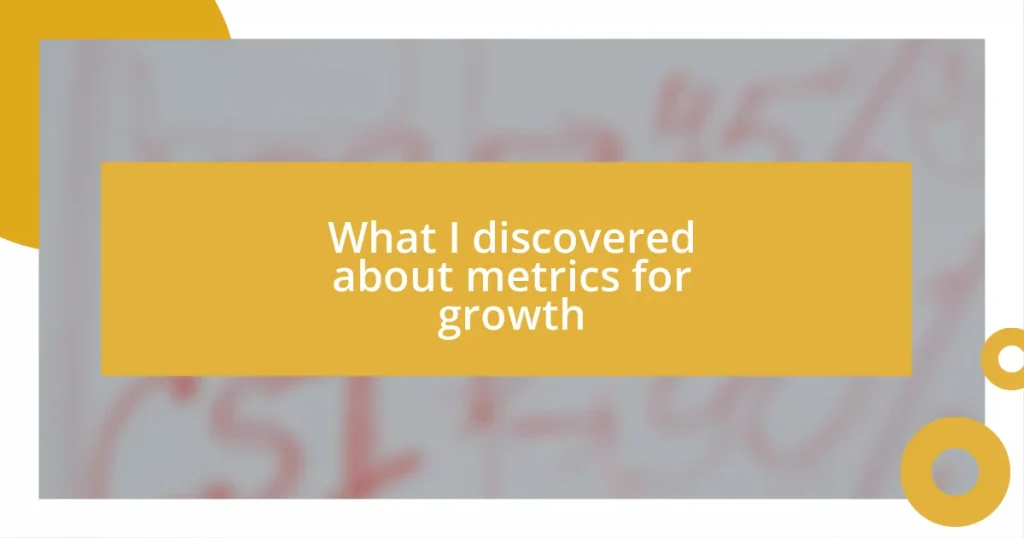Key takeaways:
- Identifying common planning roadblocks such as unclear goals, resource limitations, and self-doubt is crucial for effective planning.
- Developing a flexible planning strategy with structured deadlines and open communication helps teams adapt to unexpected challenges and encourages innovative problem-solving.
- Building accountability through support systems, mentorship, and collaboration fosters motivation and enhances the planning process.

Identifying common planning roadblocks
Some of the common planning roadblocks I’ve encountered over the years include unclear goals, lack of resources, and even fear of failure. I remember a project where I was so excited to start, but without clear objectives, I felt like I was navigating a maze without a map. It’s essential to take a step back and ask yourself: Are my goals specific and achievable? If the answer is no, it’s time to re-evaluate.
Another significant hurdle is resource limitations—whether it’s time, money, or manpower. I’ve faced numerous situations where I was enthusiastic about launching an initiative, only to realize I didn’t have the necessary budget or team support. It’s tough, but I learned that budgeting and planning for contingencies up front can often mitigate these challenges. Has that ever happened to you?
Lastly, there’s that nagging self-doubt that creeps in when you’re planning. I can still recall a project I hesitated to share with others, doubting its value and fearing criticism. The emotional turmoil of planning while feeling exposed is real, but overcoming that fear often leads to collaborative support and fresh perspectives. If you find yourself in a similar spot, remember—embracing vulnerability can be a powerful catalyst for growth.

Analyzing personal barriers to planning
Understanding the personal barriers that can impede effective planning is crucial for anyone looking to achieve their goals. I’ve often found that my own fears and doubts have been the most significant roadblocks. For example, during a time when I was tasked with leading a new project, I was consumed by the fear of not meeting expectations. This fear alone stalled my progress and created a sense of paralysis. It’s a tough position to be in, but recognizing these feelings is the first step toward overcoming them.
Here are some common personal barriers I’ve experienced that might resonate with you:
- Unrealistic expectations: I’d often set goals that were far too ambitious, leading to feelings of overwhelm.
- Procrastination: Sometimes, I’d avoid planning altogether, which only magnified my anxiety about getting started.
- Perfectionism: I felt that every detail needed to be flawless before I could proceed, causing unnecessary delays.
- Fear of criticism: The worry of how others would perceive my plans often held me back from sharing them openly.
- Lack of self-confidence: I frequently questioned my ability to execute plans effectively, deterring me from fully committing.
Recognizing and addressing these barriers has allowed me to plan more effectively and approach new challenges with a clearer mindset.

Developing a flexible planning strategy
Developing a flexible planning strategy allows for adaptability when unexpected challenges arise. I vividly remember a time when my team and I were knee-deep into a project, and a key supplier suddenly went out of business. Instead of panicking, we quickly convened to brainstorm alternative solutions. That day, I learned that having a flexible mindset can lead to innovative problem-solving. It’s essential to see setbacks as opportunities for creativity.
In my experience, the key to flexibility lies in setting flexible deadlines and encouraging open communication within your team. For instance, during a timeline crunch, I implemented weekly check-ins where we could discuss any roadblocks or changes. This approach not only kept everyone aligned but fostered a culture of collaboration. When everyone feels valued, it becomes easier to pivot when plans need to change.
Lastly, remember that flexibility doesn’t mean a lack of structure. I’ve found creating a framework that allows for adjustments can bring both clarity and freedom. Think of it like a GPS that recalculates when you take a wrong turn. A balance of structure and flexibility keeps your plans on track while allowing for necessary modifications. Have you ever adjusted your path mid-journey? Those moments can lead to the most rewarding outcomes.
| Approach | Description |
|---|---|
| Adaptability | The ability to adjust plans when unexpected challenges arise. |
| Open Communication | Fostering an environment for team members to express concerns and share updates. |
| Structured Flexibility | Creating a framework that allows for adjustments without losing sight of overall goals. |

Establishing realistic goals and timelines
Establishing realistic goals and timelines is something I’ve had to learn the hard way. Early in my career, I vividly recall setting an overly ambitious timeline for a marketing campaign, thinking that if I aimed high, I’d somehow reach my goal. Instead, I found myself scrambling to meet deadlines, which only led to burnout and disappointment. The lesson? Balance is key. I’ve learned that breaking larger goals into manageable milestones not only alleviates pressure but also creates a sense of achievement along the way.
I often advise others to take a critical look at their timelines with a sense of realism. Ask yourself: Does this timeline reflect the resources I have? When I reflect on my past projects, I realized that allowing extra time for unforeseen challenges was a game changer in my planning process. For instance, during a major product launch, I built in buffer days which turned out to be invaluable when last-minute changes were needed. This taught me to embrace a more thoughtful approach that considers potential hiccups, rather than viewing them as obstacles.
Lastly, I encourage the practice of regularly revisiting and adjusting goals as needed. Life is dynamic, and sometimes our initial plans need a refresh. In one project, I found that reassessing my goals every few weeks, in light of new insights or changes in the market, kept my projects relevant and grounded. It’s like regularly tuning a musical instrument; it’s necessary to ensure everything remains harmonious. Have you ever tried adjusting your goals on the fly? I’m telling you, that flexibility can lead to transformative outcomes in your planning journey.

Utilizing tools for effective planning
Utilizing the right tools for effective planning can truly transform how we navigate our projects. For instance, I discovered the power of digital project management software early on in my career. When I first introduced a platform like Trello, it was like flipping a switch. Suddenly, my team could visualize tasks, deadlines, and priorities all in one place. How much easier is it to stay on track when everything is laid out neatly, right?
On a particularly challenging project, I found myself overwhelmed with juggling various responsibilities. That’s when I turned to time-tracking apps. They not only helped me better understand where my time was going but also encouraged me to break my work blocks into focused sessions. I often ask myself, “What can I accomplish in 25 minutes?” This approach kept my productivity high and fatigue low. Honestly, those small wins made a world of difference in my motivation.
Moreover, I’ve learned that collaboration tools can enhance communication beyond email threads. Using platforms like Slack allowed my team to share quick updates and ideas in real time. It created a vibrant atmosphere that fostered innovation. Have you ever experienced a moment of inspiration sparked by a simple chat? That’s the magic of using the right tools—not just for organization, but to breathe life into our planning processes.

Building accountability and support systems
Building accountability and support systems has been a cornerstone in overcoming my planning roadblocks. I remember joining a mastermind group where members shared their goals and progress on a regular basis. It felt like stepping into a safe space where vulnerability was welcomed. Having people who truly cared about my journey not only held me accountable but also ignited a fierce determination to succeed. When’s the last time someone genuinely checked in on your plans? That kind of community can be a game changer.
I’ve also leaned heavily on mentorship to bolster my accountability. There was a time when I felt adrift in a sea of objectives, unsure of where to steer next. Connecting with a mentor who set clear check-in points for our discussions made all the difference. I still remember our weekly sessions, where I would lay out what I aimed to achieve by the next meeting. Those conversations weren’t just about tracking progress; they became a source of motivation, lifting my spirits whenever I felt overwhelmed. Have you considered seeking out someone who can guide you in your planning? It’s incredible how an experienced voice can illuminate the path forward.
Moreover, the impact of sharing goals within a supportive network has been profound. I started a small accountability group with colleagues, and we quickly made it a habit to celebrate even the tiniest wins. I fondly recall our little victories—like when I finally completed a project I had been dragging my feet on. The cheers and high-fives were not just for finishing the task but for the collective effort and encouragement that got me there. What if you created a space for shared accountability? It’s a powerful way to keep everyone motivated and on track, making the planning process much less daunting.





